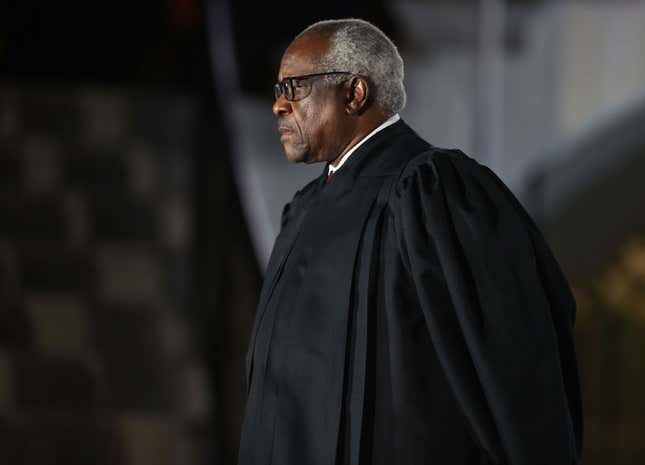
Supreme Court Justice Clarence Thomas is not done setting fire to precedent. After his concurrent opinion on Friday stated a desire for the court to revisit rights like gay marriage and the right to contraceptives, Thomas signaled that he possibly wants to lower the standard for public figures to sue media entities, as The Hill reports.
On Monday, the Supreme Court declined to look at New York Times v. Sullivan (1964), a case that established a higher standard for citizens to claim libel against news organizations. Under the current standard, public figures suing for defamation must prove that the defendant acted with “actual malice” and made a reckless decision.
A Christian media group named Coral Ridge Ministries Media, Inc sued the Southern Poverty Law Center for defamation for calling Coral Ridge an “ anti-LGBT hate group.” As Business Insider notes, Coral Ridge’s suit alleged that Amazon would not allow the organization to participate in a donation program because of the SPLC’s designation on its website and materials. Lower courts dismissed the lawsuit; thus, the appeal went to the Supreme Court.
Justice Thomas dissented from the decision not to hear the case in question.
“This case is one of many showing how New York Times and its progeny have allowed media organizations and interest groups ‘to cast false aspersions on public figures with near impunity,’” Thomas wrote.
“SPLC’s ‘hate group’ designation lumped Coral Ridge’s Christian ministry with groups like the Ku Klux Klan and Neo-Nazis,” the justice added. “It placed Coral Ridge on an interactive, online ‘Hate Map’ and caused Coral Ridge concrete financial injury by excluding it from the AmazonSmile donation program. Nonetheless, unable to satisfy the ‘almost impossible’ actual-malice standard this Court has imposed, Coral Ridge could not hold SPLC to account for what it maintains is a blatant falsehood.”
This echoes a sentiment Thomas took in 2019 about a defamation lawsuit against Bill Cosby and a 2021 written opinion that Justice Neil Gorsuch joined. He even laid out a framework where the government could regulate social media platforms like Twitter. If the conservative-slated Supreme Court eventually heed the call of Thomas, the high standards to prove libel could be lowered.

